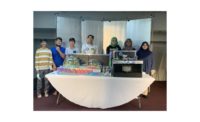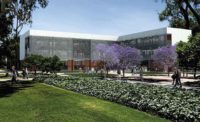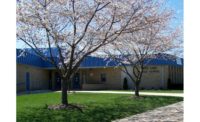WASHINGTON — A city of the future — Toyama — engineered by students from Warwick Middle School in Lititz, Pennsylvania, has won the grand prize at the 27th annual 2019 Future City® Competition. The students, Grace Kegel, Lauren Matt, Xavier Flaiz, Matthew Bacon, Joseph Conrad, Carter Hain, Connor Henry, Paige Misavage, Ivan Tejeda, Liam Zee, Jonah Ahlers, Olivia Boland, Zoe Buchanan, Kyle Charles, Ben Cosmore, Marin Davis, Carolyn Eisenbach, Nate Hovan, Thomas Jeanes, Caden Lausch, Elena Smith, Aiden Troop, Rebekah Trovinger, Maggie Turner, and Nate Wenger teamed with educator Mike Smith and 15-year-old volunteer mentor Christian Kegel to earn this year’s top honors. The Future City Finals, which concluded Feb. 19th at the Hyatt Regency Washington on Capitol Hill, is one of the showcase events taking place during Engineers Week.
Students from Warwick Middle School earned the grand prize of a trip to U.S. Space Camp and $7,500 for its school’s STEM program (provided by Finals sponsor Bentley Systems Inc.). Their city’s solution is based on the model the team researched, developed, and presented.
“Being at a competition with some of the brightest minds in the country is truly a blessing,” said 13-year-old Grace Kegel. “My takeaway from this amazing experience is that I can do it. It’s all possible.”
Second place went to students in the Alabama region from the Academy for Science and Foreign Language in Huntsville, Alabama. The students, Ann Metuge, Walden Wilder, Zion Tesfaye, Thomas Sing, and Olivia Costley teamed with educator Angela Traylor and volunteer mentor Ray Woodson, for their Future City, Emerald City. Their school received a $5,000 scholarship for its STEM program, sponsored by the National Society of Professional Engineers (NSPE).
“Dream big, win bigger,” said Alabama region team member Olivia Costley.
Kaifukuryoku, engineered by New Jersey Region students from JerseySTEM, earned third place honors. Their program receives a $2,000 scholarship for its STEM program, sponsored by Shell.
Honorable mention for fourth place went to Idaho region students from Sacred Heart Catholic School for their Future City, Baru. Fifth place was awarded to Mid-Atlantic region students from Edlin School for their city, Imperium. Each receives $750 for their organization’s STEM programs, sponsored by NCEES (National Council of Examiners for Engineering and Surveying).
This program forces students to figure out the best way to do things, said Christian Kegel, a Future City alum.
“I’m especially fascinated by the communication between the tech and art teams,” Kegel said. “When students come together to solve problems – that’s engineering.”
Since last fall, more than 40,000 middle school students from 1,500 schools in 41 U.S. regions, as well as teams from Canada and China, have imagined, designed, and built cities for the 2018-2019 Future City competition. This year’s theme, “Powering Our Future,” challenges students to design innovative ways to power their future city that can that can withstand and quickly recover from the impacts of a natural disaster.
The Future City competition is a project-based learning experience where students in sixth, seventh, and eighth grades imagine, research, design, and build cities of the future. Keeping the engineering design process and project management front and center, students are asked to address an authentic, real-world question: How can we make the world a better place?
During the Future City Competition, students work as a team to complete five deliverables. They design a virtual city using SimCity™ software and research a city-wide issue and write an essay describing their findings and innovative solutions. Teams complete a project plan to help keep their project on track. They also build a tabletop-scale model of their city using recycled materials and create a short presentation about their city.
One of the nation’s most popular engineering education programs, Future City has received national recognition and acclaim for its role in encouraging middle schoolers to develop their interest in science, technology, engineering, and math (STEM). In 2017, Future City received a prestigious national award as a leading engineering education program, as it was recognized by US2020 and cofounding sponsors Chevron and Tata Consultancy Services for its achievements and innovations in STEM education and its accessibility to underrepresented youth.
In 2016, the Future City Competition received the 2016 Henry C. Turner Prize for Innovation in Construction, presented by Turner Construction Company and the National Building Museum.
In 2015, Future City was named the grand prize winner in the UL (Underwriters Laboratories Inc.) Innovative Education Award program, receiving a $100,000 award. The UL award highlights the essential, urgent and significant value of E-STEM education.
Future City has ongoing opportunities for engineering and technical professionals to volunteer in a number of different roles, including mentors and regional coordinators. For information about Future City or to volunteer, visit www.futurecity.org.
Major funding for the Future City Finals comes from the Bechtel Corp., Bentley Systems, Inc, Shell Oil Company, and DiscoverE. Additional program support provided by EA, NCEES, UEF, and UL. UL also sponsored the City Essay this cycle.
For more information, visit https://futurecity.org.






